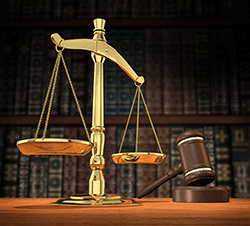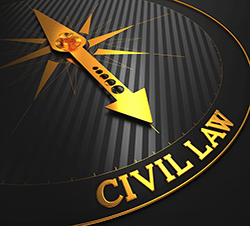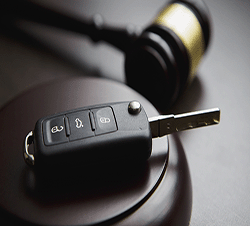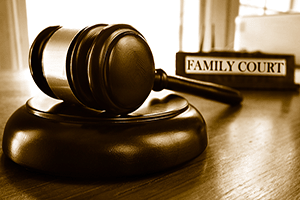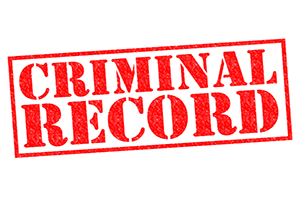Accessing the court system in Denton County, Texas, requires a clear understanding of the different courts and the processes involved in accessing records. Whether your interest lies in criminal proceedings, civil disputes, or family law, Denton County has courts for each type of case. With nearly a million residence, this Texas county has a multitude of courts catering to specific types of cases. This comprehensive guide is designed to help you find the court records you need while providing an in-depth overview of the judicial system in Denton County.
Understanding the Judicial System in Denton County Texas
Denton County has a multifaceted judicial system, comprised of multiple courts with specific roles with the types of cases they handle. Becoming familiar with the different courts is helpful for understanding where to look for particular records. Here is a breakdown of the different courts that service this community.
District Courts
Denton County District Courts are responsible for processing the most serious and heinous criminal cases, including felonies, large civil cases, and family legal issues such as divorce and child custody arrangements. This judicial division has general jurisdiction over any case which makes them able to hear nearly any type of criminal and civil case. The District Courts also serve as a platform for appeals in certain cases, creating a path for those that want to challenge lower court decisions. This appeal process is an important part of the legal system, making sure that there are available options to those that choose to appeal an outcome or conviction.
County Courts at Law
County Courts at Law are the primary courthouses for hearing misdemeanor criminal cases, probate matters, and civil cases that are lower than those at the District level. These courts also handle a myriad of appeals that originate from Justice of the Peace and Municipal Courts. The misdemeanor cases heard at this level include minor thefts, assaults, and DUIs. These cases are often handled within a few days to obtain quick resolutions to smaller criminal offenses. Probate matters are also heard at this level, which involve the distribution of a deceased person's estate. These cases can range from simple to complex, depending on the size of the estate and the presence of a will.
Justice of the Peace Courts
Justice of the Peace Courts (JP) primarily hear various small claims cases, landlord and tenant disputes, and minor criminal offenses, as well as traffic citations. These courts are known for being quick and accessible for hearing small cases, with a less formal setting that is geared for the average person. Most cases heard in this lower division are usually resolved within a day. The informal nature of the JP Courts makes this a good venue for self-representing themselves. Defendants and plaintiffs present their cases without necessarily needing an attorney or jury.
Municipal Courts
The Municipal Courts operate at a local level and mostly deal with city ordinance violations, including traffic tickets and misdemeanors that occur within the city limits. There is usually one of these courts per city, but sometimes more depending on the population. Traffic violations are the most common cases heard in the Municipal Division. They handle everything from speeding tickets and parking infractions to misdemeanor DUIs. City ordinance violations primarily include noise complaints or zoning infractions, and other smaller criminal infractions. These cases revolve around protecting community standards and the interests of the respective cities.
How to Look Up Denton County Texas Court Records
Looking up court records in Denton County can easily be done by anyone for any reason since they are considered public records. Access to court case proceedings and outcomes can be done through the County Judicial Website. The process quite simple following these instructions:
Online Access: Denton County offers convenient online access to a plethora of court case records through the official county website.
1). Visit the Denton County Website: Start by navigating to the official Denton County website. This site serves as a hub for accessing various court record databases and offers comprehensive information about the county's legal system.
2). Use the Public Access Portal: The Public Access Portal is a user-friendly tool that allows you to search for court records by party name, case numbers, or other attorney name. The portal gives public access to a wide array of records, including those related to criminal, civil, probate, and family law cases.
3). Search for Specific Records: Utilize the search function by entering known details, such as the full name of a party involved or a case number. This specificity helps narrow down search results, making it easier to locate the exact records you need.
4). Review Your Records: Once you've located the indented records, make sure to review details such as court dates, case status, and filed documents to make sure you have the information you need. Official copies of records will cost extra and possibly longer to procure and sent to you.
In-Person Requests: For those who'd rather request records in person, appointments can be made with the County Clerk's Office , or using the self-service terminals at the specific court where the case was heard. Here’s what you need to know to facilitate this process:
1). Visit the Appropriate Office: Depending on the type of record you need, you may need to visit the District Clerk for district court cases or the County Clerk for county court records. Identifying the correct office will save you time and expedite the process. Making an appointment is recommended.
2). Provide Necessary Information: Be prepared to supply identifying details such as the case number or the names of parties involved. This information assists the court staff in locating the precise records you require.
3). Request Copies: You can request copies of the documents you need, but be aware that there may be a nominal fee for printing or copying records. Understanding any associated costs beforehand can help you prepare accordingly.
Types of Court Cases and Records Available
By fully understanding the types of cases each court handles can be instrumental in determining where to search for the records you're interested in. Here’s a detailed overview of the case types managed by various courthouses.
Criminal Court Cases: Criminal cases are divided between the District Courts, which handle felony charges, and County Courts at Law, which manage misdemeanors. Criminal court records may include arrest records, trial proceedings, and sentencing details. The type of case and the seriousness of the offense will determine which courthouse the case is heard in. Felony cases will often be handled by the District courts, where misdemeanor cases often handled in the County Courts at Law.
Civil Court Cases: Civil cases range from disputes between individuals or organizations, include personal injury claims and contract disagreements. Depending on the monetary significance of the dispute, these cases could be heard in either District level or County level. Personal injury cases, usually revolving around claims for damages due to accidents or work-place negligence, are a common types of civil litigations. Records from these cases can include medical reports, settlement agreements, and court judgments, giving insights into the outcomes and compensations awarded.
Family Law Cases: Family legal cases such as divorce, child custody, and adoption, are generally heard in the District level. Commonly sought after records in these cases can include court orders, custody arrangements, and divorce decrees. Divorce proceedings are often complex legal and emotional situations, with records detailing asset division, spousal support, and child custody arrangements. Where child custody cases focus on determining the best interests of the child, with records outlining custody agreements, visitation schedules, and any modifications to the arrangements.
Probate Cases: Probate matters which mainly deal with administration and distribution of estates after someone's death, are typically handled at the county level courts. The probate process often involves validating a person's last will, appointing an executor, and overseeing the distribution of assets and property. Records from these cases are commonly requested for beneficiaries, executors, and anyone involved in the administration of a deceased person's estate. Where guardianships determine the legal responsibility for those unable to care for themselves. Records in these cases include court orders appointing guardians and their respective responsibilities.
Traffic and Ordinance Violations: Municipal and JP Courts mostly deal with traffic violations and local ordinance infractions. Records from these courts include citations, court dates, and resolutions including fines, restitution, and probation. Traffic violations, most commonly speeding or red light tickets, fill up the daily court dockets. These records offer useful information for those contesting tickets or seeking leniency in penalties. City ordinance violations most commonly include issues like noise complaints, trespassing, or property maintenance infractions. Records from these cases highlight the nature of the violation, any fines or penalties imposed, and the resolution to the respective violations.
Privacy and Access Limitations
While the majority of Denton County court records are public, there are restrictions in place to protect sensitive information. Certain documents, such as those involving minors, sealed or expunged cases, are not available for public viewing. It's important to first check the guidelines for accessing court case records to make sure you're in compliance with state and federal privacy laws.
Understanding the balance between public access and privacy protection is required of anyone accessing publicly available records. Courts are tasked with safeguarding sensitive information while managing transparency in legal proceedings, making sure the public's right to access records does not violate and privacy laws. Sealed cases, which may include confidential or sensitive information, are restricted from public access unless allowed by a court order. These restrictions are in place to protect the identities and sensitive information of those involved. Juvenile records are another area with strict privacy restrictions, making sure that anyone under the age of 18 is protected by their case being sealed from public view.
How Do I Lookup a Denton County Court Case?
You can either lookup a specific court case in Denton County by visiting the County's Judicial website, or by contacting the Clerk of the Court in the specific courthouse a case was heard. Since most court cases are public records you can also use third party public record websites to lookup court case information.
Are Denton County Court Records Considered Public Records?
Yes, the majority of court records throughout the state of Texas, including Denton County, are considered public records. This means that anyone can access court case information without needing to ask permission. The only exception to this is records that are sealed, expunged, or sensitive in nature.



